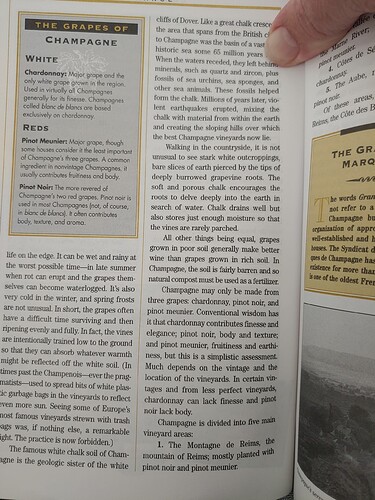honest mistake.
My memory was only partially accurate…
Thanks for this - it’s a very thought-provoking read. “Why is wine important” is a great question.
Really great article. Sobering. My guess is that it is no different in other areas like food or music.
And this is before AI…
I’m not so sure that wine writers are facing significantly different circumstances than other print journalists. Unfortunately, journalism is a mature and dying profession.
And, yes, AI will soon make it even harder for all journalists to succeed financially.
Indeed, I think there’s a dearth of insight into the culture of wine now - contributing to the lack of new wine lovers. I know that I was seduced by the blend of travel, food and culture writing that brought wine to life for me. If I was a young(er) person these days, I’m not sure I would so easily encounter that sort of tantalizing invitation to explore.
I also noted that MacNeil’s entire blog entry is composed of extremely short blocks. I know it was prepared remarks for a speech, but it also reminded me of how writing online seems to require more line breaks and hooks to keep people’s minds from wandering.
I think evolving is a better word.
There is no reason to believe that humans will not want to know things about our world. That has always been the case and always will be the case.
The form that ‘journalism’ takes will naturally evolve. And the Big Media Rooms of the mid-20th century won’t last forever. But that’s the normal progression of things.
(Of course the ‘friction’ of the displacement is challenging and the scale of our current displacement - across industries - is especially challenging. But that is maybe more of a political discussion…)
When and if AI becomes the dominant form of wine writing, wine communications will truly become an elliptical feedback loop of innocuous information that means nothing to anyone. A feedback loop so devoid of creativity, so lacking in thinking, that wine itself may lose its meaning.
Let’s be honest - most wine writing for mass publications has been crap for a decade or more. But that doesn’t mean there isn’t amazing wine journalism and people bringing to life stories about wine and the wine world.
While there are some real gems still writing about wine (e.g. a terrific wine writer masquerading as a critic/editor-in-chief of TWA), much of long-form informational content and storytelling has moved into the podcast world. In a certain way, it’s a more natural medium for wine discussion, since so much of wine knowledge is through the form of oral history.
All it takes is one listen to Levi Dalton’s interview with [Kevin Zraly / Joel Peterson / Jacques Seyesses / Becky Wasserman], or a Bedrock Wine Conversations interview with [Carole Merideth / Jason Jardine / Graeme Macdonald] to know that wine stories are being brought to life and shared with a mass public in a way that was nearly impossible 20 years ago.
You’re absolutely right. The quality of those podcasts is super high. Last I’d heard, IDTT was ended due to lack of sponsorship.
I should have specified print journalism, which I believe is dying before our eyes and has been for the past decade. People don’t read.
Of course, you and Vince are correct that there are and will be other forms of journalism/mass communication. I miss newspapers and magazines and books, although I consume written material all day long on a screen of one size or another.
I think we need to separate do people want wine writing / wine journalism vs are they willing to pay for it.
A very thought provoking article
Oh the irony in reading an article complaining about the lack of fact-checking and just blatantly wrong “facts” that includes a piece like “For a writer like me, the ratio of sheep to winemakers in New Zealand is exactly the kind of crazy little gem that helps tell the story of a place. (Just in case you’re wondering, it’s 5 to 1, sheep to winemakers).”
If you know anything about anything, this ratio must be completely wrong, only after a slight glance. Like, really, really wrong.
Google says there are about 25 million sheep and 5 million people in NZ. Unless every single person in NZ is a winemaker, that number just can’t be right.
If they are complaining about wine writers getting their facts straight, I wish they started with themselves.
Oral traditions were paramount until the printing press and then the written word was dominant until radio and then video sped up the cycles. But we still incorporate oral storytelling in the new mediums. And until we can use telepathy, I have to believe there is a place for the written word!
Robert’s point is key: what is the business model.
I suppose the niche worlds driven by passion are what get most of us, but for broader livelihoods, it is going to be chaotic.
I found it a bit scattershot. And some things jumped out to me as just plain off. For example " Do you know how many newspapers in America have a journalist on staff who covers wine? Two. There used to be hundreds." Hundreds? That seems way off to me. I would be surprised if more than a dozen newspapers ever had an on staff writer dedicated to wine.
I was under the impression that WSJ, NYT, and WP all have journalists dedicated to wine.
@Jamie_Goode wrote an intriguing blog article back in 2022 that covered this topic.
The SF Chronicle has two.
